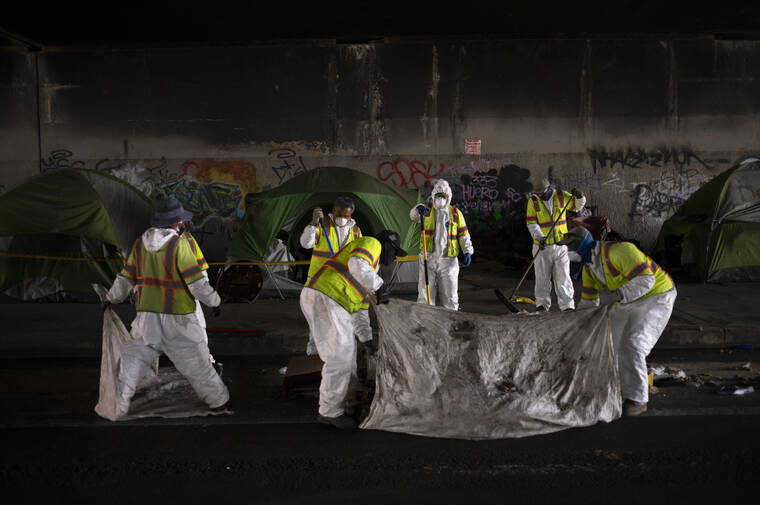Supreme Court to decide if local laws targeting homeless are ‘cruel and unusual’

ASSOCIATED PRESS / OCT. 24
Los Angeles city employees clean up a homeless encampment to relocate homeless individuals into temporary housing as part of Los Angeles Mayor Karen Bass’ Inside Safe program in October.
WASHINGTON >> The Supreme Court agreed Friday to review lower-court rulings that make it harder for cities in the western United States to prevent people from sleeping on the streets when there aren’t enough beds in homeless shelters.
The justices will hear an appeal from the city of Grants Pass, in southwestern Oregon, that has the backing of California Gov. Gavin Newsom, a Democrat, as well as other Democratic and Republican elected officials who have struggled to deal with homelessness brought on by rising housing costs and income inequality.
The court’s action comes a day after a panel of the 9th U.S. Circuit Court of Appeals affirmed a lower-court ruling blocking anti-camping ordinances in San Francisco, where Newsom once was the mayor.
A separate 9th Circuit panel ruled in the Oregon case that Grants Pass could not enforce local ordinances that prohibit homeless people “from using a blanket, pillow, or cardboard box for protection from the elements.” The decision applies across nine Western states: Alaska, Arizona, California, Hawaii, Idaho, Montana, Nevada, Oregon and Washington.
Locally, the American Civil Liberties Union of Hawaii’s has challenged sweeps in Honolulu and on Maui.
In August the ACLU’s motion for an injunction argued that Honolulu’s procedures constitute cruel or unusual punishment under the Hawaii Constitution and should therefore cease immediately via court order.
Don't miss out on what's happening!
Stay in touch with breaking news, as it happens, conveniently in your email inbox. It's FREE!
But 1st Circuit Judge John M. Tonaki this month denied the ACLU’s motion for the injunction, which allows the city to continue to enforce “essential public safety measures without impediment,” according to a city statement.
Following a November 2021 sweep on Maui, the ALCU the following month appealed to the 2nd Circuit Court on behalf of two of the homeless people who lost property, alleging the county’s procedures and actions violated their state and federal constitutional rights of due process.
The court ruled that the plaintiffs were entitled to a contested case hearing before their property was destroyed.
The county then appealed, and the Hawaii Supreme Court heard arguments in December.
The two 9th Circuit Court of Appeals rulings, like a 2018 decision from the 9th Circuit in a case from Boise, Idaho, found that punishing people for sleeping on the streets when no alternative shelter is available amounts to “cruel and unusual punishment” in violation of the Constitution.
Elected officials urged the justices to take up the case because they say the rulings complicate their efforts to clear tent encampments, which have long existed in West Coast cities but have more recently become more common across the U.S. The federal count of homeless people reached 580,000 in 2023, driven by a lack of affordable housing, a pandemic that economically wrecked households, and a lack of access to mental health and addiction treatment.
“The Supreme Court can now correct course and end the costly delays from lawsuits that have plagued our efforts to clear encampments and deliver services to those in need,” Newsom said in a statement.
Theane Evangelis, a lawyer for Grants Pass, said in a statement that the appellate decisions “are actually harming the very people they purport to protect.”
Homeless people and their advocates say the sweeps are cruel and a waste of taxpayer money. They say the answer is more housing, not crackdowns.
“The issue before the Court is whether cities can punish homeless residents simply for existing without access to shelter,” Ed Johnson, a lawyer for homeless people who challenged the Grants Pass ordinances, said in a statement. “Nevertheless, some politicians and others are cynically and falsely blaming the judiciary for the homelessness crisis to distract the public and deflect blame for years of failed policies.”
Cities from Los Angeles to New York have stepped up efforts to clear encampments, records reviewed by The Associated Press show, as public pressure grew to address what some residents say are dangerous and unsanitary living conditions. But despite tens of millions of dollars spent in recent years, there appears to be little reduction in the number of tents propped up on sidewalks, in parks and by freeway offramps.
It’s unclear whether the case will be argued in the spring or the fall.
———
Star-Advertiser staff writer Dan Nakaso contributed to this report.



